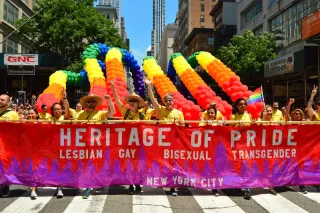August 23, 2017
Our Future: On the Rise of Lil Peep
Kyle Mangione-Smith READ TIME: 4 MIN.
Lil Peep
I remember first discovering Lil Peep. Not the exact circumstances, but I remember plugging his name into YouTube and playing the video for "White Wine," the first suggestion. And, despite how outwardly glaring the entire experience should have been, when its two minutes past I was astounded at how little of an impression it had left. It felt like some bizarre amalgamation between Fall Out Boy and Chief Keef, with lyrics almost exclusively about getting high, being sad, and committing suicide. As for Peep himself, the guy was covered head to toe in tattoos (including multiple on the face), with a lanky, carefree demeanor. His hair was bleach blonde, with remnants of pink on the end. I felt as if I'd forgotten the whole experience five minutes later.
I love hip hop, including a lot of hip hop that's dumb and fun and never really aspired to be much else, but in the last few months I can't help but feel vaguely depressed and tired with the SoundCloud rap scene. More than anything that's occurred in music in the last two decades, I think it's indicative of just how drastically the Internet has changed the way we consume and create music, though the SoundCloud scene is only a piece in a much larger picture when it comes to how the Internet has changed hip hop specifically.
Lil Peep
I remember back in the early 2010s discovering Odd Future and Lil B, two artists who never would have risen to fame if it weren't explicitly for their presence on the Internet, and as with many others at the time being surprised and slightly amused at their eccentricities. For the most part, they just seemed like kids messing around and having a good time, not bothering to cover up all the bumps and cracks that naturally arose from such a lax creative process. When their music did show fleeting moments of brilliance, like the come up of Frank Ocean or Earl Sweatshirt, it was all the more reason to fall in love with it. Beyond all the weirdness, it was clear that there were some genuinely passionate and worthwhile artists that never would have been given a chance through a different medium.
You can see the same carefree, unconventional attitude in Lil Peep and most other SoundCloud rappers, but I can't help but feel like the ramshackle passion for the music itself isn't really present anymore. Where Odd Future's eccentricity seemed to stem from juvenile energy, most of Peep's weirdness seems based in a genuine lack of care. Tyler the Creator painting an upside-down cross on his forehead and mutilating his body in his videos seemed more to do with him trying to build a shock aesthetic for his music. Lil Peep getting yet another tattoo on his face feels more like the bored decision on behalf of someone who doesn't really particularly care what happens to their body anymore. Peep announced on Twitter last week that he's bisexual, and I was shocked people even considered it news. Why would anyone who knows him and his music be surprised?
Lil Peep
I can't bring myself to care anymore. SoundCloud has made it so hip hop artists comes and goes so fast that I've forgotten about most of them before they can even drop an album or go on tour. Many of them, given how incredibly young they are when they rise to fame, don't even really seem to know how exactly to go about such ventures. There seems to be an unconscious understanding that none of this is going to last, so nothing needs much effort or thought. A single song made in a bedroom with a days worth of work put into it can turn a teenager into the next big thing in a matter of days, and for the most part their life as an artist won't go much beyond the next few months that follow. So who cares, why not get your face tattooed?
In all honesty, I don't mind the actual music of a lot of SoundCloud rappers. I just can't deal with how apathetic and lifeless so much of this scene feels. On his debut album, "Come Over When You're Sober, Pt. 1," Lil Peep heavily implies that he'll likely die while he's young, and there's a good chance he might.
I don't think I would be bothered if it wasn't specifically for the demographic of the scene, which if we're being realistic, is mostly young adults and teenagers, many of whom suffer from mental illness and serious substance abuse problem. Many of them are people I knew in high school and college, smart and successful kids from affluent families. Last month, Lil Pump, another SoundCloud rapper, posted on Twitter, "Xanax is the wave." I'm not one to blame music on the problems its listeners face, but the complacency within these circles is still unnerving to me.
Kyle Mangione-Smith is a filmmaker and student living in Boston.
Watch the video of "White Wine" featuring Lil Peep and Lil Tracy.






